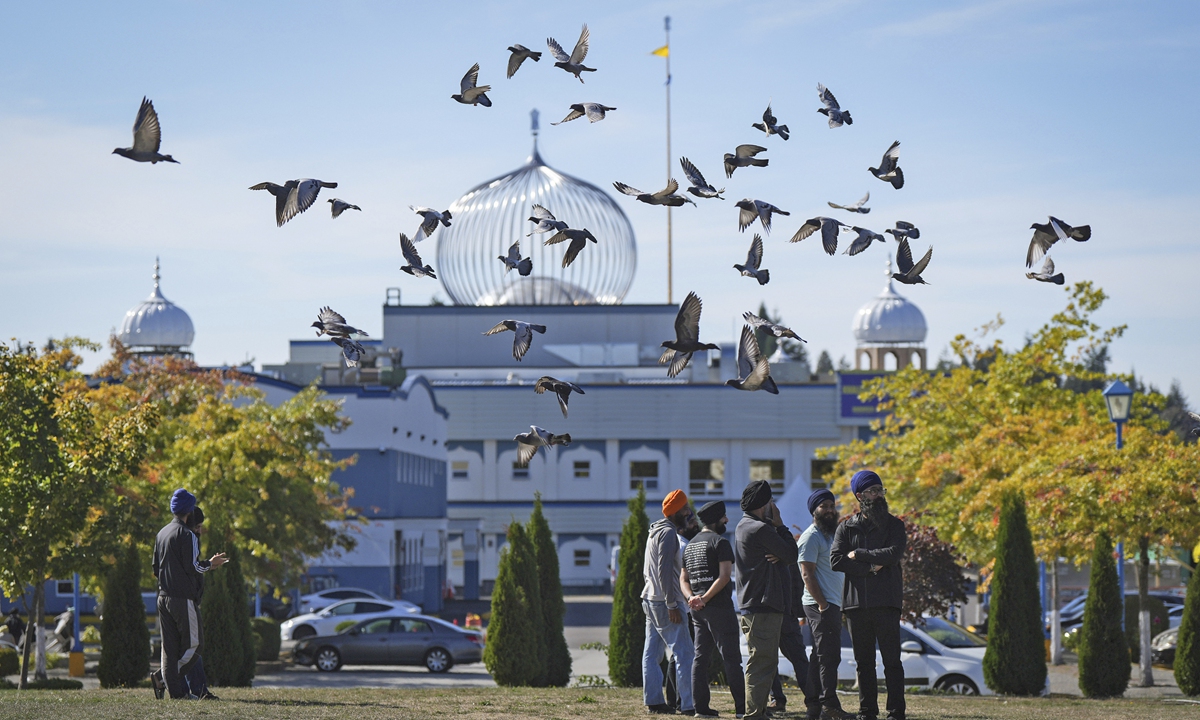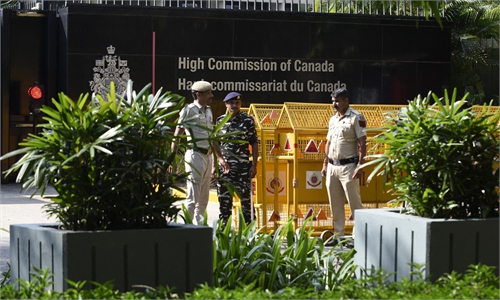'Collective silence' on Canada-India spat showcases West's 'typical double standards', reflects unequal nature of US-centered alliance

Moninder Singh (front right), a spokesperson for the British Columbia Gurdwaras Council (BCGC), waits to speak to reporters outside a temple in Surrey, British Columbia, on September 18, 2023. Canada expelled a top Indian diplomat on Monday as it accused Indian government of being involved in the assassination of the temple president Hardeep Singh Nijjar, a Canadian citizen. Photo: VCG
The diplomatic row between Canada and India over the alleged assassination of a Sikh activist has served as a perfect example of the West's double standards, experts said on Friday, noting that while allies all chose to remain silent on the issue out of their need to rope in India, they would have been quick to condemn it as a "violation of human rights" if it were not a "friend" of theirs.
The "collective silence" of the West also reflected the deep imbalance of the alliance, observers noted, where morality and rules hold no value unless it serves the US' strategic interests.
As India announced the suspension of visa services for Canadian citizens citing "security threats," a Canadian official revealed to the Associated Press on Thursday that the allegation of India's involvement in the killing is based on intelligence provided by a member of the "Five Eyes" intelligence-sharing alliance, which includes the US, Britain, Australia and New Zealand, in addition to Canada.
The anonymous official did not say which ally provided intelligence or give details of what was contained in the communications or how they were obtained, the AP report said.
However, Western countries seemed to have lost their voices as they found themselves in an embarrassing position, with one being their close ally but the other of great strategic significance in the Indo-Pacific region.
The Guardian reported that the spat comes "at an uncomfortable and unwelcome time" for Britain, the US and Australia, when the three countries are busy prioritizing closer ties with India, seeing it not just as a strategic bulwark against China's growing influence but also as a partner in the economic isolation of Russia.
Interestingly on Friday, despite Canada's desperate call for support from its allies, US Secretary of State Antony Blinken posted a photo with the foreign ministers of India, Australia and Japan on X, saying that "the Quad is vital to our shared vision for a free and open Indo-Pacific."
Underneath the tweet, an Indian netizen asked, "So US is on our side on the Canada issue right?" Another commented with a face of a seemingly furious Justin Trudeau.
"The issue has reflected the unequal nature of the US-centered alliance system, where allies exist only to fulfill the US' own strategic interests, but never the other way around," Li Haidong, a professor at the China Foreign Affairs University, told the Global Times on Friday.
Allies are also well aware of this imbalance and understand that they will eventually become expendable to the US when their interests collide, Li noted. As a result, deep-seated rifts persist within the Western alliance system, and its morals and rules are only meaningful when they serve the US' needs.
Yang Xiyu, a senior research fellow at the China Institute of International Studies, told the Global Times that the matter has also demonstrated a typical "double standard" act of the West.
If the spat had happened between Canada and a country outside of the Western "friend circle," the camp would definitely have reacted in a different manner, such as condemning the country as being "in violation of human rights," observers noted. However, given India's geopolitical value, the US-led West has long chosen to turn a blind eye to its human rights issues even though attacks on minorities, especially Muslims, have been on the rise under the Modi administration.
Despite the great efforts the West has made to warm ties with India, the incident has once again reminded New Delhi that it ultimately still has different ideologies and interests with the West, as the West cannot change its colonial mindset toward India, and it is almost impossible for them to cooperate with India on an equal footing, Li said.
Relations plummeted to their lowest point between India and Canada following the incident, as negotiations for a trade deal between the two paused due to issues "of serious concern," India's commerce and trade minister said.

